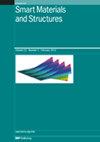On the time-dependent sliding contact behavior of three-phase polymer matrix smart composites
IF 3.8
3区 材料科学
Q1 INSTRUMENTS & INSTRUMENTATION
引用次数: 0
Abstract
Three-phase smart composites consisting of magnetostrictive and piezoelectric reinforcements embedded with a polymer matrix can achieve specific multifunctional properties in response to external stimuli, which are well-suited for the application of sensors, actuators, and electronic devices. The materials exhibit complex behaviors characterized by electro-magneto-viscoelasticity coupling during the contact of these smart structures. This paper proposes a novel hybrid element method for numerically analyzing the frictionless sliding contact problem stemming from the viscoelastic behavior and multiphase interactions of polymer matrix smart composites. The study aims to fully investigate the effects of material properties, sliding velocities, and action time on the contact behavior of materials via the integration of the conjugate gradient method with the discrete convolution-fast Fourier transform algorithm. The analytical viscoelastic frequency response functions are derived by substituting elastic solutions with the time-dependent relaxation modulus. Numerical results show that three-phase polymer matrix smart composites exhibit lower contact pressure and higher surface electric/magnetic potential than three-phase magneto-electro-elastic composites. Sliding velocity and action time strongly influence the distribution of pressure/stress and electric/magnetic potential.论三相聚合物基智能复合材料随时间变化的滑动接触行为
由嵌入聚合物基体的磁致伸缩增强材料和压电增强材料组成的三相智能复合材料可在响应外部刺激时实现特定的多功能特性,非常适合传感器、致动器和电子设备的应用。在这些智能结构的接触过程中,材料表现出复杂的行为,其特点是电-磁-粘弹性耦合。本文提出了一种新型混合元素方法,用于数值分析由聚合物基智能复合材料的粘弹性行为和多相相互作用引起的无摩擦滑动接触问题。该研究旨在通过共轭梯度法与离散卷积-快速傅立叶变换算法的整合,充分研究材料特性、滑动速度和作用时间对材料接触行为的影响。通过用随时间变化的松弛模量代替弹性解,得出了分析粘弹性频率响应函数。数值结果表明,与三相磁电弹性复合材料相比,三相聚合物基智能复合材料表现出更低的接触压力和更高的表面电势/磁势。滑动速度和作用时间对压力/应力和电势/磁势的分布有很大影响。
本文章由计算机程序翻译,如有差异,请以英文原文为准。
求助全文
约1分钟内获得全文
求助全文
来源期刊

Smart Materials and Structures
工程技术-材料科学:综合
CiteScore
7.50
自引率
12.20%
发文量
317
审稿时长
3 months
期刊介绍:
Smart Materials and Structures (SMS) is a multi-disciplinary engineering journal that explores the creation and utilization of novel forms of transduction. It is a leading journal in the area of smart materials and structures, publishing the most important results from different regions of the world, largely from Asia, Europe and North America. The results may be as disparate as the development of new materials and active composite systems, derived using theoretical predictions to complex structural systems, which generate new capabilities by incorporating enabling new smart material transducers. The theoretical predictions are usually accompanied with experimental verification, characterizing the performance of new structures and devices. These systems are examined from the nanoscale to the macroscopic. SMS has a Board of Associate Editors who are specialists in a multitude of areas, ensuring that reviews are fast, fair and performed by experts in all sub-disciplines of smart materials, systems and structures.
A smart material is defined as any material that is capable of being controlled such that its response and properties change under a stimulus. A smart structure or system is capable of reacting to stimuli or the environment in a prescribed manner. SMS is committed to understanding, expanding and dissemination of knowledge in this subject matter.
 求助内容:
求助内容: 应助结果提醒方式:
应助结果提醒方式:


